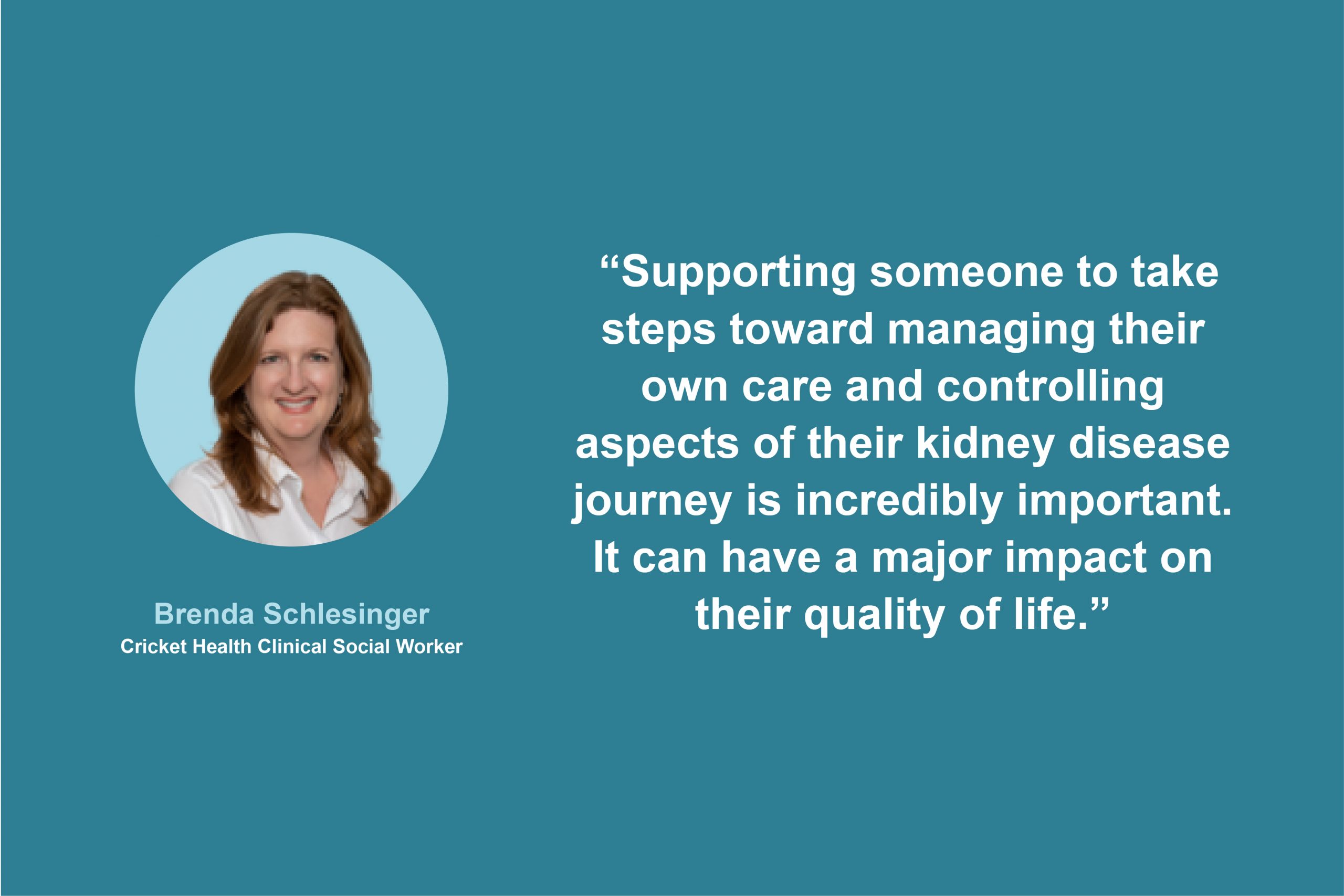Each year, May marks Mental Health Awareness month. At Cricket Health, we understand that mental health plays a critical role for people managing kidney disease. We created MyCricket™ to connect people with kidney disease with peer support and educational resources, as well as an interdisciplinary care team, including nurse practitioners, nurses, clinical pharmacists, dietitians, and social workers. Our goal is to ensure no one with kidney disease feels isolated or alone in their kidney care journey.
We sat down with Brenda Schlesinger, Cricket Health Clinical Social Worker, to discuss how kidney disease and mental health are intertwined, why and how Cricket Health care teams approach mental health care, and how kidney disease patients can receive the help they need to improve their kidney care journey.
Cricket Health: What is the connection between kidney disease and mental health?
Brenda Schlesinger: Many people with kidney disease also suffer from depression, anxiety, or sometimes cognitive impairment. Chronic kidney disease (CKD) and end-stage kidney disease (ESKD) alone can impact the quality of life. People who join Cricket Health often have other conditions that affect their mobility, mood, and they sometimes have had multiple hospitalizations. The stress of managing all of this is emotionally exhausting.
Research shows that hospitalizations due to mental health disorders (particularly depression, anxiety, and substance abuse) are 1.5 to 3 times more common among patients with CKD than individuals with other chronic diseases.
This research also tells us that depression is common in CKD patients. We see this anecdotally too. A diagnosis of kidney disease can leave people feeling isolated, overwhelmed, and anxious.
What kind of support do people with kidney disease need?
Brenda Schlesinger: People with kidney disease need individualized support to meet their physical and mental health needs and peer support to help them realize they are not going through this alone.
Each person with kidney disease has individual needs. As a clinical social worker, I help people with a wide variety of tasks to help them manage their disease. These tasks can sometimes seem simple, but the additional support and resources can make a difference in the quality of people’s day to day lives. Sometimes a person’s needs are more complex, and I am more involved in ensuring appropriate mental health services are provided. Additionally, our social work team helps people overcome socioeconomic barriers to care like food insecurity, health literacy, or transportation.
A few of the ways we frequently help people include:
- Support to ease anxiety over the adjustment to dialysis or adjusting to having CKD
- Facilitating mental health care services
- Signing up for medical transportation
- Reminders to contact their providers for appointments
- Education and planning for dialysis treatments and/or kidney transplant
- Wellness education related to diet, exercise, and other self-care behaviors
- Getting referrals for durable medical equipment
- Home health referrals
- Completing and discussing advance care directives such as living wills, durable power of attorney, and end-of-life preferences.
How does Cricket Health prioritize mental health?
Brenda Schlesinger: We screen each person for depression when we start working with them. If the screening identifies a person may indeed have depression, a social worker is added to that person’s care team and engages with them immediately to further evaluate and make a care plan. The social worker ensures the person receives appropriate care, keeps the other team members in the loop during the entire process, and continues assisting as needed throughout the kidney care journey.
What are common mental health issues the Cricket Health care team addresses?
Brenda Schlesinger: Many different issues can affect the mental health of people with kidney disease, and they are unique to each patient. Common issues include:
- Adjustment to their new “normal” and adjustment to the idea that they may need to go on dialysis
- Body image issues related to dialysis access placement
- Anxiety about the unknown progression of their disease
- Pre-existing mental health conditions
- Job loss, or the inability to continue working their current job due to fatigue, or sometimes their dialysis schedule
- Relationship issues including separations or divorce, intimacy issues due to medication side effects or body image, or difficulty seeking family support out of a desire to not burden their family
- And a variety of other conditions that may affect their overall health.
What are the biggest adjustments patients with CKD need to make to remain healthy — mind and body?
Brenda Schlesinger: We focus on reminding people to remain optimistic as they look towards the future. Research tells us that people who stay forward-thinking stay healthier, their mood is better, and they are more resilient. We remind everyone that their health is more in their control than they think. Setting a goal such as maintaining blood pressure control can help restore a sense of control in their own care.
Does every Cricket Health patient receive support from a social worker? How often?
Brenda Schlesinger: Every Cricket Health member has access to a social worker when they need one. If one is not assigned to them initially, they can ask for one at any time, and they are evaluated periodically to determine new needs that may require social work support. Our team will work with them to achieve both long-term and short-term goals, including addressing barriers to care.
Both the patient and the clinician determine the frequency of that care. Some members may meet with their social worker every week, particularly if something stressful is happening. Others may check in only once every few months.
How do you interact with these patients?
Brenda Schlesinger: We work with patients through MyCricket, Cricket Health’s comprehensive patient support program. We can chat with them virtually and talk by phone, depending on their personal preferences.
How do referrals to counselors and resources work?
Brenda Schlesinger: We frequently help Cricket Health members access mental health professionals through their health plan or employer. We consider their individual needs, financial resources, and location to find them the services that will meet their needs and work best for them.
You mentioned peer mentors on a patient’s care team; how do they offer a layer of mental health support?
Brenda Schlesinger: Peer mentors are specially selected and trained members of the kidney care community who uniquely understand the challenges associated with living with kidney disease. Peer mentors provide an outlet for people to discuss their fears and concerns throughout their kidney care journey. They can share stories about their care and experiences from the perspective of someone who has been through it before.
How has COVID impacted patients’ mental health? Are there any common challenges?
Brenda Schlesinger: Isolation is a huge concern for people with CKD/ESKD, who are already at higher risk for depression. The ongoing COVID-19 pandemic has made the depression risk, associated with isolation, even worse. Many people have mourned the loss of their social support systems, such as attending events at the senior center or gathering with others for meals and activities. Others who enjoyed serving their community have lost volunteering opportunities, impacting their sense of purpose. Some people have lost loved ones that they could not say goodbye to due to pandemic restrictions that are necessary to minimize the spread of the disease.
People have also faced an added layer of stress about the safety of attending medical appointments. Many patients have felt they had to choose between safely quarantining and visiting doctors offices for appointments.
That is why Cricket Health has made it a priority to deliver care virtually and by phone — to ensure people are getting the support they need, when they need it, regardless of their ability to make it to an in-person appointment.
Can you share a story that impacted you positively from working with a patient?
Brenda Schlesinger: Every person I work with inspires me. I had a patient last year who reached out for support surrounding his anxiety toward COVID-19. He was concerned his wife was not taking the precautions seriously enough. We talked through ways he could feel like he was taking control of his safety and advocating for what he needed while maintaining his relationship. Over time, his anxiety reduced.
Recently, I was asked to chat with a patient who had been putting off getting to a nephrologist for years. At the end of the conversation, I was able to get confirmation from the patient that they would schedule an appointment. A few weeks later, they sent me a message saying their appointment had been confirmed, and they wanted to talk about their feelings toward the experience. This patient went from being a passive observer in his care to an active participant in his health.
These may not seem like earth-shattering events and results, but supporting someone to take steps toward managing their own care and controlling aspects of their kidney disease journey is incredibly important. It can have a major impact on their quality of life.




